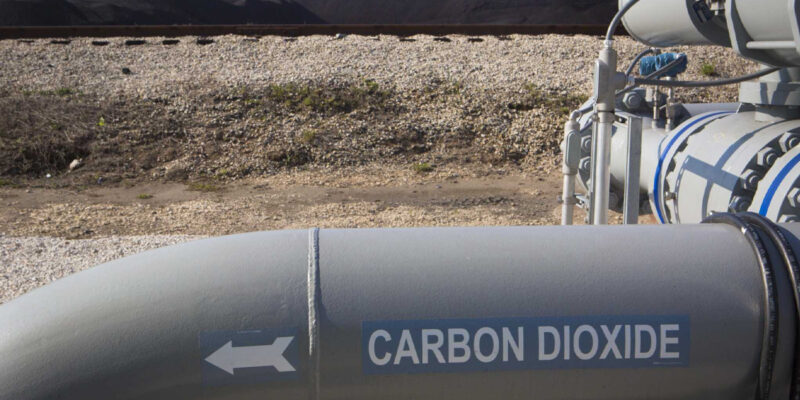As the Majority Leader of the Louisiana State Senate and a candidate for Governor, I wanted to address recent claims made by Mr. Alexander regarding my legislative efforts to strengthen regulatory language in relation to carbon storage facilities in Louisiana. Mr. Alexander incorrectly asserted that my legislation made expropriation or eminent domain easier and more favorable to carbon storage facilities, which is simply not true.
The legislation referenced in the article, SB 353, passed in 2020, was crafted to strengthen the regulatory framework necessary for the development of the emerging CO2 storage industry in the Gulf Coast.
The truth is that private companies have had expropriation authority for projects related to oil and gas pipelines and storage for several decades. These laws have been declared to be in the public interest in Louisiana for years. The same requirements for expropriation for oil and gas pipelines apply to carbon storage facilities, including good faith negotiations, market rate compensation for property, and going through the court expropriation process by showing public need, among other factors. The Carbon Sequestration Act of 2009 states that CO2 sequestration is for the public good, just like Louisiana’s laws for underground storage of oil and gas. This legislation passed before I was in the State Senate.
It is critical to understand that Louisiana has long-standing laws that declare natural gas pipelines, gas gathering lines, and transportation of natural gas by pipelines as being in the public interest. These industries are regulated to ensure public safety and welfare. Similarly, the transportation, storage, and geologic storage of carbon dioxide are also categorized as being in the public interest and for a public purpose in Louisiana laws. The law that states that “carbon capture and sequestration” (CCS) is a “public good” has been in the Louisiana Statutes for many years before my time in the Legislature.
In addition, claims that my legislation made expropriation easier or that Louisiana favors CO2 over other industries are unfounded. In fact, the expropriation language for CO2 transportation and storage was added to state law in R.S. 30:1108 in 2009 in Act 517. My SB 353 in 2020 simply added similar expropriation language to another section of law, R.S. 19:2, where expropriation authority generally exists.
I remain committed to strengthening regulatory language and improving landowners’ rights while ensuring that Louisiana’s laws continue to serve the public interest and welfare.
The exact language in state law and in the constitution that support my statements can be seen below:
La. R.S. 30:1102 (CO2 Act – passed in 2009)
A. It is declared to be in the public interest for a public purpose and the policy of Louisiana that:
(3) Geologic storage of carbon dioxide may allow for the orderly withdrawal as appropriate or necessary, thereby allowing carbon dioxide to be available for commercial, industrial, or other uses, including the use of carbon dioxide for enhanced recovery of oil and gas.
Advertisement
(4) It is the public policy of Louisiana and the purpose of this Chapter to provide for a coordinated statewide program related to the storage of carbon dioxide and to also fulfill the state’s primary responsibility for assuring compliance with the federal Safe Drinking Water Act, including any amendments thereto related to the underground injection of carbon dioxide.
This is the same language used in Louisiana’s law for underground storage of oil and gas, as well as Louisiana’s laws for pipeline transportation of hydrocarbons. Below are references to these laws to substantiate these claims:
La. 30:22(A) (passed in 1962, for example; amended in 2008 to simply add CO2):
The underground storage of natural gas, liquid hydrocarbons, and carbon dioxide which promotes conservation of natural gas or liquid hydrocarbons, or which permits the building of large quantities of natural gas or liquid hydrocarbons in reserve for orderly withdrawal in periods of peak demand, making natural gas or liquid hydrocarbons more readily available to the consumer, or which provides more uniform withdrawal from various gas or oil fields, each is in the public interest and for a public purpose.
La. Constitution. Article IX, Section 2:
A. Public Policy; Regulation. — Natural gas is declared to be affected with a public interest. Notwithstanding any provision of this constitution relative to the powers and duties of the Public Service Commission, the legislature shall provide by law for regulation of natural gas by the regulatory authority it designates. It may designate the Public Service Commission as the regulatory authority.
B. Pipelines. — No intrastate natural gas pipeline or gas gathering line shall be connected with an interstate natural gas pipeline, and no interstate natural gas pipeline shall be connected with an intrastate natural gas pipeline, without a certificate of public convenience and necessity issued as provided by law after application for the connection and hearing thereon.
La. R.S. 45:301:
The transportation or sale of natural gas by pipelines to local distributing systems for resale is affected with a public interest and such pipelines, appurtenances and facilities to the extent of such transportation or sales are public utilities subject to the jurisdiction of the Louisiana Public Service Commission.
Advertisement
Advertisement

